The Life Cycle of a Successful Presidency
- In the Beginning: The Board's Role in Welcoming the New President (Spring 2004)
- Timely and Thoughtful Does It: The Board's Role in Evaluating the President (Summer 2004)
- Guardians of the Process: The Board's Role in a Presidential Search (Autumn 2004)
- Managing the Sweet Sorrow of Parting: The Board's Role as the President Leaves (New Year 2005)
|
Maybe it's taken months; maybe years. It started with an honest and perhaps even discomforting self-assessment that unearthed points of strength and weakness, followed by a heartfelt consideration of what qualities and gifts that special someone should possess, and then a painstaking, epic search of national -- sometimes international -- proportions.
Finally, after all the ruminating, after jittery, whirlwind meetings with a few potential matches, you find The One. Sometimes they've appeared out of the blue; other times they've been under your nose all along. More often it seems they're an acquaintance or a friend of a friend. Tentative conversations about who they are lead to serious discussions about a shared future. Then it's time to pop the question. And -- joy! -- they say yes.
No wonder seminary trustees might feel a sense of relief and exhilaration after they've picked a new president. They're understandably looking forward to the big day when the new president takes office. But the lion's share of a board's job is just beginning when the search concludes. New seminary presidents and trustees who've served during their transitions know that building a successful board-president relationship takes work, and a new president's honeymoon period can be made much sweeter with some thoughtful gestures and special attentiveness from the board.
Getting to know a school
Like most schools, Washington Bible College and Capital Bible Seminary, an evangelical, nondenominational school in Lanham, Maryland, worked hard at getting to know their new president during the candidate phase. "They built a process that allowed them to really know whom they were selecting," said Dr. Larry Mercer, who took office in 2005. This time it was particularly important, said board chair Matthew Duranske, because Mercer is the first president who didn't have a previous affiliation with the school.
But Mercer didn't just wait around until moving day to get up to speed with his new job. Between January, when it was announced Mercer would be coming, and July, when he arrived, he made seven trips from his home in Chicago and spent a total of 31 days on campus. The board handled his travel and lodging, and Mercer got to meet faculty and staff and spend time in the homes of trustees and alumni. "It gave me a sense of the rhythm of the institution," he said.
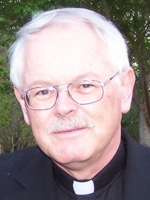 |
| More than two years before he arrived at Oblate School of Theology, Father Ron Rolheiser knew he would be coming, so he began traveling from Canada to attend board meetings. (OBLATE SCHOOL OF THEOLOGY) |
Father Ronald Rolheiser, a priest of the Missionary Oblates of Mary Immaculate, is president of Oblate School of Theology, a Roman Catholic seminary in San Antonio, Texas. He encourages seminary boards to get presidents-elect involved early. Like Mercer, the time after he accepted the position and before he moved into his new office in August 2005 was critical. "I knew I would be going into the job two and a half years before I took office," he says, and in that time he kept an eye on the enrollment data and other developments at the school and traveled from his home in Canada to attend board meetings. "The lead time allowed me to get a feel for the school and reflect on the institution before I got here," he said. "It meant I wasn't a stranger on my first day."
When there's familiarity
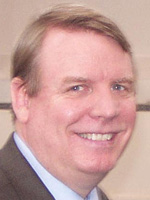 |
| Dr.Gregg Mast (above) and David Van Ningen (below) of New Brunswick Theological Seminary know that familiarity can sometimes lead to false assumptions, so they've made deliberate communication a priority. (NEW BRUNSWICK THEOLOGICAL SEMINARY) |
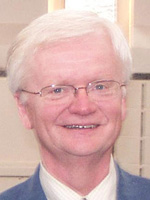 |
Dr. Gregg Mast took office as president of New Brunswick Theological Seminary in New Brunswick, New Jersey, on January 1, 2006. He had been working in New York City as director of ministry for the Reformed Church in America and had had modest involvement in the seminary board through his role as an ex officio member. His appointment seemed especially apt since he had graduated from the school in 1976 and was called to be president while present at a board meeting.
Still, "Familiarity can serve as a disadvantage," said David Van Ningen, chair of the board at New Brunswick and co-chair of the presidential search committee. "You can make assumptions about understandings that really aren't there. We were very deliberate in making sure we communicated clearly who we were, our mission, our strengths, our challenges. It was critical that the new president not come in naïve, that he was aware of some of the issues facing the school."
Like Mast, Sulpician Father Gerald Brown, president-rector of St. Patrick's Seminary and University, first came to the school as a student, back in 1958. "I've never lost complete contact with this place," he said of the school, which is in the Catholic Archdiocese of San Francisco. In the 12 years he served as provincial of his order, Brown visited the campus in Menlo Park, California, and attended board meetings at least once a year; he also spent time as rector of the now-closed St. Joseph College Seminary, a feeder school for St. Patrick's.
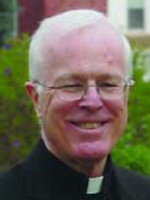 |
| Father Gerald Brown has been associated with St. Patrick's Seminary for almost 50 years, but constant change means there's always a learning curve. (ST. PATRICK'S SEMINARY & UNIVERSITY) |
"If there's someone that trustees know who has the skill sets and aptitudes needed, that can be an advantage," Brown said. But even in his third year as president and with almost 50 years of connection to St. Patrick's, "I'm still learning, because things change so rapidly."
Breaking bread together
Not surprisingly, sharing a meal is a popular way for presidents and trustees to build relationships and share information and ideas. Early in Rolheiser's tenure at Oblate School of Theology, the development department organized a series of lunches for him with two or three different board members at a time. "We'd meet from 12 to 1:15 and get a chance to talk. They'd affirm my ideas and make other suggestions. I'd highly recommend it. It's amazing how much of a difference that makes."
Atlantic School of Theology in Halifax, Nova Scotia, holds five board meetings a year, and Canon Eric Beresford, who took office at the end of 2004, seized the opportunity to have dinner with the board chair before the rest of the trustees arrived for each meeting. "It helped enormously," he said. "It allowed me to get a sense of how the meeting might go, and it helped both of us understand where the other was coming from."
Making less-than-perfect timing work
Nelson Clare recently retired from the board of Oblate School of Theology after 18 years, and he advises boards that face a long interim period before a new president can take the helm to have patience and tenacity. "Many times these people wear different hats and have different obligations. Sometimes the terms of the obligations overlap, as was the case with Father Rolheiser. But we knew we had the best candidate. "The board kept the future-president in the loop while working with a transitional administration.
Timing isn't always perfect for trustees, either. The end of a trustee's term as chair can be disconcerting for a new president. New Brunswick's Mast found himself in that situation just as he was getting into his new role. "I made the unusual request that the board consider extending his term one year so my first full year we would be together. It felt like a good idea to do that at a time when the president was so new. "The board -- and Van Ningen himself -- graciously agreed.
When Beresford arrived at Atlantic School of Theology, which is affiliated with the Anglican Church of Canada, the Roman Catholic Church, and the United Church of Canada, the chair had just six months left in his term. "He and I were together enough to get to know each other well and become good friends," Beresford said. "After he left, I had a confidante who was familiar with the situation, with the issues and personalities, but was a step removed. That's been hugely helpful."
Going out, staying home, or picking up the phone
New presidents and seminary trustees often run in the same circles, so bumping into each other at events are opportunities to socialize. "We both come out for the major lectures, the galas and fundraisers and special events, both at the seminary and at other institutions," said Rolheiser. "You sit at the same table and talk and get to know each other."
It doesn't have to be at a black-tie event, though. Mercer recalls a football game he and board chair Duranske took in with their families. He's also visited with trustees in their homes.
"Particularly in an institution that has a strong sense of community, an outsider has to work harder, and people often don't recognize that," Mercer said."It takes time and contact to build personal relationships, and that needs to occur for a president to be effective."
In-person contact isn't always possible, though, particularly for trustees who live across the state, the country, or beyond. "The president of the board lives in Iowa and the seminary is in New Jersey, so he can't stop in for lunch," said Mast. "But he's very intentional about calling every month or so to ask how things are going. "Those kinds of calls, Mast said, "are often less about providing knowledge and more about providing emotional and spiritual support."
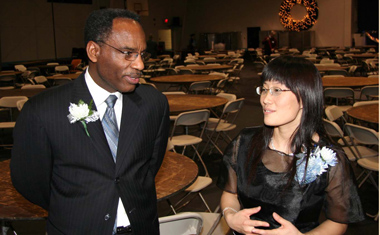 |
| Dr. Larry Mercer suggests an institutional audit before the new president takes office so that everyone agrees on institutional priorities. Here he shares a word with Capital Bible Seminary student Cindy Zhang at the school's annual Christmas dinner and concert. (WASHINGTON BIBLE COLLEGE / CAPITAL BIBLE SEMINARY) |
Paving the way
Phone calls, e-mails, and dinners are important, but training can also go a long way in helping smooth a new president's transition. "One of the most important things the board did was to send me to the Association of Theological Schools New Presidents Seminar in New Orleans," Beresford said. "It provided me with tools I could use to understand what could be an otherwise overwhelming context."
Mercer suggests schools conduct an institutional audit shortly before a new president takes office. "It's a strategic thing to do that helps a new leader to understand the top concerns of the community and the issues and themes that are important to the institution," he said. "That way everyone starts with a clear focus of what the priorities are, and everyone's reading from the same sheet of music." Having someone from outside the school do the audit can help, Mercer said. "Sometimes it takes a pair of fresh eyes to see what's there."
Capital Bible Seminary made a significant purchase during Mercer's first year in office -- a house for the president. "It took a lot of work on the part of the board, but we were able to get a house a block from the campus," said Duranske. The purchase was all the more valuable because it saves the president from the snarly Washington-area commute. But boards of schools without presidential housing can help with this important piece, too. "Do not underestimate the importance of a good realtor," said Beresford. "The board found us a fabulous one."
Filling in the gaps
"I'm lucky to be somewhere I know I can trust people," said Brown of his experience at St. Patrick's. "But boards need to make sure that a new person has all the information he needs to make good decisions. Where trustees can really help a new president is in understanding the nature of the local situation." One of the questions Beresford had before taking the job at Atlantic was whether his wife would be able to move her practice as a congregational development consultant from Toronto to Halifax. "The board was helpful in letting us know what the life of the church was like in the region, and what could or couldn't happen."
One of Mast's early requests of the board was that they take part in an evaluative process of the president, as part of a larger evaluation by other seminary constituencies, including students and administrators. While they hadn't done one in the recent past, "the board was very responsive to that."
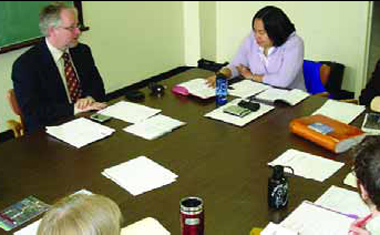 |
| Canon Eric Beresford leads an ethics seminar at Atlantic School of Theology. (ATLANTIC SCHOOL OF THEOLOGY) |
Retreating to move forward
Beresford recommends new presidents and boards go on retreat six months to a year into the job. His own retreat with the Atlantic School of Theology board was about 18 months into his tenure -- longer than he recommends -- and they used In Trust's Board Self-Assessment. "It was a good and helpful time, not just for the intense and effective work that we did, but for the different context of relationship building it provided."
Capital Bible Seminary's annual board retreat is two or three days of work on the budget and long-term planning, but it includes plenty of free time for interactions. The first retreat Mercer attended with the board was an eyeopener. "The more we understand each other's hearts and values, the more we're able to put things in context. It makes the process of dialogue more effective." said Mercer."Plus, it was a really good time."
Get on board
Bishops from 18 dioceses send students to St. Patrick's, so Brown says it's important for him to have up-to-date, informed board members who know the work of the church and the kind of priests that are needed. "It's a real validation and support to me that I can say honestly that the school's programs and policies are fully supported by our board of trustees," he said.
That kind of support translates into dollars, too. After Rolheiser and the Oblate board had a "Visioning Day" not long after he was tapped to be president, he presented the board with his vision statement -- a statement that covered ideological and educational philosophy and vision for the school -- for their feedback and reflection. "I'm grateful the board was so wonderfully affirming of the vision," he said. "They were 100 percent supportive, telling me, 'We'll find the resources for you.' That's a key thing for a board to say: 'You need money? We'll get it.'"
Still, "There's a limit to how helpful the board will be," said Beresford. "There's a certain loneliness to the role [of president] that's inevitable. It's the president who has to step back and understand historic relationships and see what might help to move things forward."
Navigating treacherous terrain
Those historical relationships -- including recent institutional events and sometimes even a broader history -- can add to the presidential learning curve, particularly when a president assumes the new post under less-than-ideal circumstances. The Catholic clergy sex-abuse crisis that came to light more than five years ago has prompted increased scrutiny of all Catholic seminaries regardless of an individual institution's involvement in the scandal, and presidents and trustees know that they will be under a microscope.
At New Brunswick, Mast came into office following the well-publicized departure of the former president, the Rev. Norman J. Kansfield. Kansfield stepped down in the midst of controversy after he officiated at his daughter's 2004 same-sex wedding in Massachusetts. In a situation where many people connected to the seminary had strong feelings -- pro and con -- about the outgoing president and the board's role in his departure, Mast faced more than the standard challenges of a new president.
About a month after his arrival, the seminary celebrated Mast's inauguration with two days of lectures, receptions, and worship opportunities. The entire board attended and helped with much of the planning. "The inauguration was a grand opportunity for the community to celebrate its past and imagine its future," said Mast.
Van Ningen agreed. "The inauguration did a wonderful job of bringing the community together to welcome Gregg, to introduce him to the broader seminary community. I can't emphasize enough the importance of giving the community the assurance that the person the board brought in would do well."
Appreciating differences
Challenges facing the board and new president are often much less dramatic, however. Simple differences in personal style can be jarring, particularly if the former president and board worked together for a long time. Capital Seminary board chair Duranske points out that Mercer and the school's former president operate very differently and "there's not a whole lot you can do to prepare an organization for different leadership styles." Still, Mercer said he appreciates Duranske's efforts to do just that. "He's worked at helping the board make that transition. You have to make a conscious choice to acknowledge that there's a different person in the role with a different style of leadership."
And if each president has unique characteristics and styles, that's also true of boards. "We sat down very early on with Gregg to share who we were as individuals and corporately, and how we understood ourselves," said New Brunswick's Van Ningen. "In order to govern effectively, we had to have an idea of who we think we are."
Recognizing and playing to a new president's strengths is essential, too. "We went into this knowing we'd selected the best CEO," said Nelson Clare of Oblate. "He's a wonderful speaker, author, teacher, and theologian. If he's not a natural fundraiser, we'll pick up the slack on that. We as a board have many different strengths, and we can help provide balance where we need to."